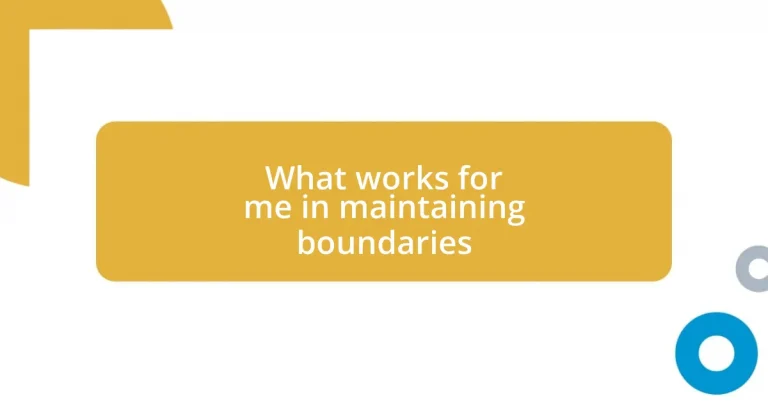Key takeaways:
- Recognizing personal boundaries is essential for emotional well-being and fosters healthier relationships.
- Clear communication of boundaries, using techniques like “I statements,” helps others respect personal limits and encourages open dialogue.
- Consistency in maintaining boundaries is crucial; journaling can aid in reinforcing the importance of these limits.
- Regular reflection and adjustment of boundaries are key to ensuring they align with personal needs and emotional health.
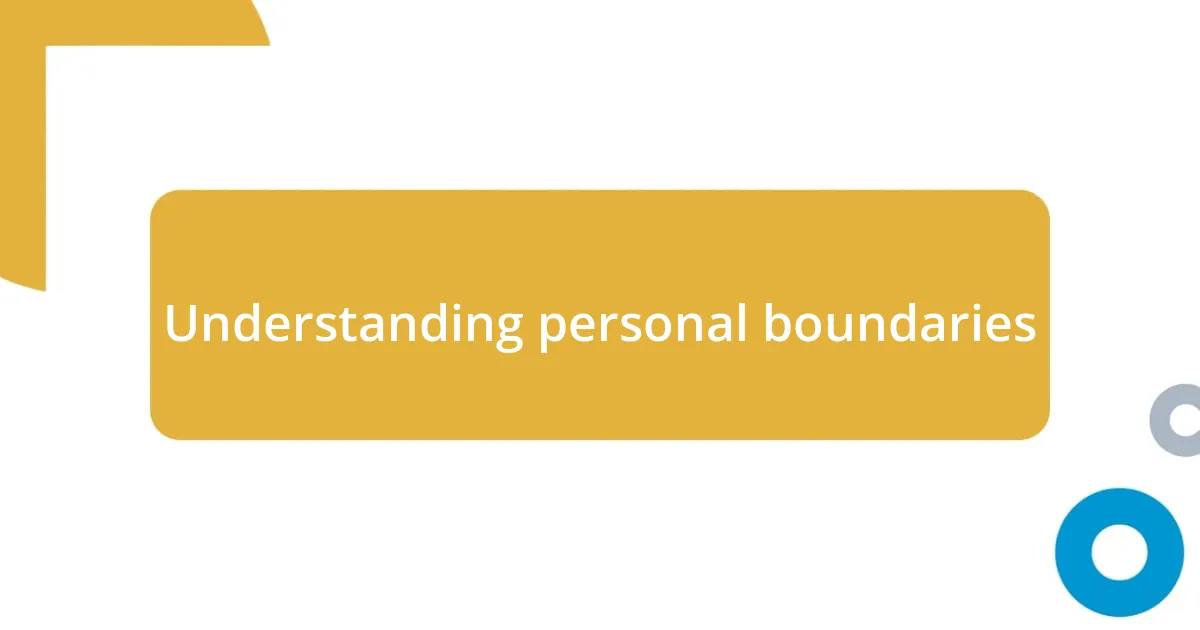
Understanding personal boundaries
Understanding personal boundaries is such a crucial aspect of emotional well-being. I remember a time when I felt overwhelmed by the demands of friends and family. It made me realize that my boundaries were fuzzy, almost like a blurred line where my needs got lost.
Acting on instinct, I began to assess what made me feel uncomfortable or drained. I asked myself, “What situations leave me feeling resentful or anxious?” Each time I paused to reflect, I uncovered layers of my personal limits that I hadn’t consciously acknowledged before. It’s fascinating how simply recognizing these feelings can illuminate the paths to setting healthier boundaries.
I often remind myself that boundaries don’t just protect me; they also foster healthier relationships. For instance, when I started saying no to social invitations that didn’t genuinely appeal to me, I felt a wave of liberation. I found that clarity in my boundaries not only conserved my energy but also attracted people who respected my space. Isn’t it interesting how establishing these boundaries can lead to more meaningful connections?
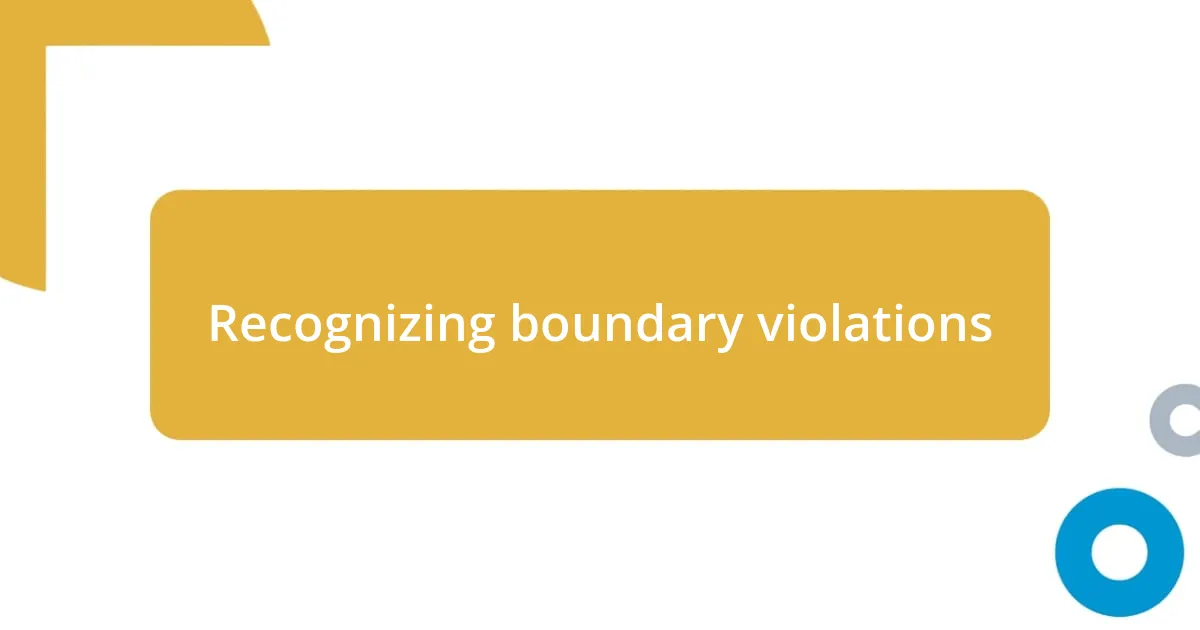
Recognizing boundary violations
Recognizing boundary violations often starts with tuning into our emotional reactions. I once brushed off a friend’s constant need for my attention, convincing myself it was just a phase. However, deep down, I felt my energy being drained. It took a series of similar experiences to help me realize that these moments weren’t just casual interactions; they were clear violations of my boundaries.
Here are some signs that indicate a boundary violation:
– Feelings of guilt or obligation: If you often feel you “have to” do something, your boundaries might be at stake.
– Emotional exhaustion: If certain interactions leave you feeling depleted, it’s a strong indicator that your limits are being disregarded.
– Resentment: When you start feeling bitter about taking on extra tasks or responsibilities for others, it’s time to reassess your boundaries.
– Invasion of privacy: If someone frequently asks about your personal life when you’re not comfortable sharing, that’s a signal of crossed boundaries.
– Constant interruptions: If a colleague or friend habitually interrupts you while you’re speaking, it shows a lack of respect for your time and opinions.
Each of these signs, when noticed, serves as a call-to-action for reassessing and reinforcing our boundaries.
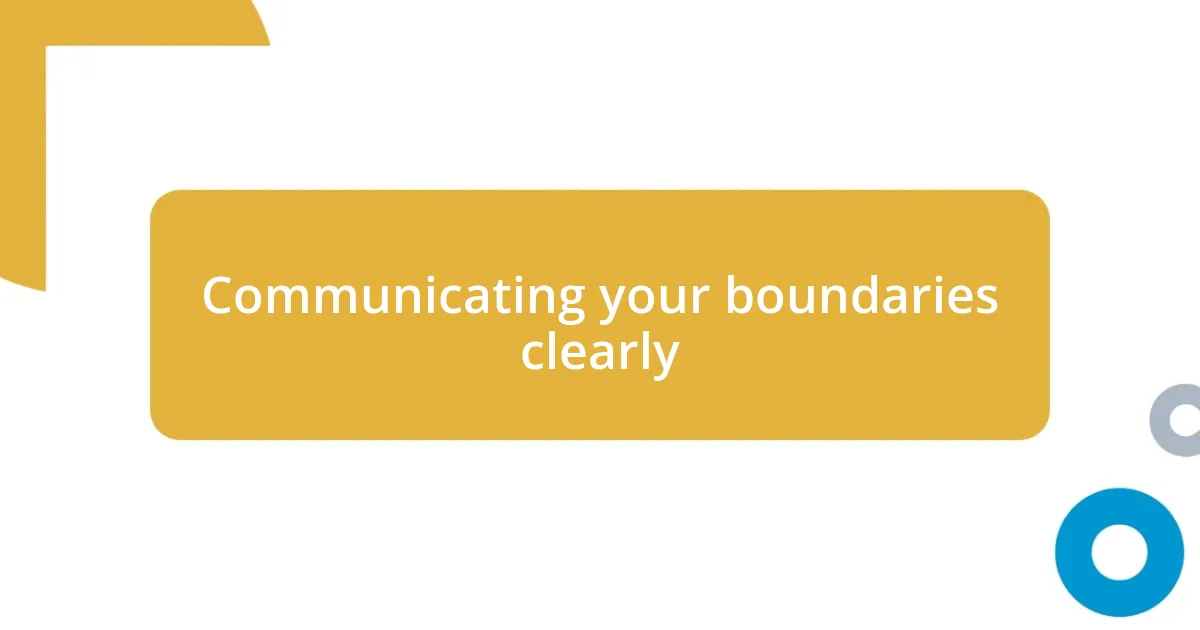
Communicating your boundaries clearly
Communicating your boundaries clearly is vital for ensuring that others understand and respect them. I vividly recall a time when I casually mentioned to a friend that I needed alone time during the weekends. Surprisingly, I found it refreshing to articulate this need. Instead of feeling guilty, I felt empowered, like I had taken control of my own space. It turned out that my friend appreciated my honesty and felt more comfortable discussing their own needs, too.
In my experience, being direct is key. I’ve been in situations where I tried to soften the message, thinking it would be more palatable. But often, that just led to confusion. Clear communication takes the guesswork out of the equation for everyone involved. For example, when I told a colleague that I couldn’t take on extra projects due to my existing workload, I delivered it succinctly and confidently. The result? They respected my limits without any hard feelings.
One simple but effective strategy I use is to practice “I statements.” Instead of saying, “You always interrupt me,” I try, “I feel undervalued when I’m interrupted.” This approach not only helps convey my feelings but also invites a more open dialogue, fostering a better understanding. It’s amazing how these small shifts in language can lead to significant improvements in how my boundaries are perceived and respected.
| Clear Communication | Indirect Communication |
|---|---|
| Respectful of personal limits | Can lead to misunderstandings |
| Prevents future violations | May create resentment |
| Encourages open dialogue | Limited ability to express needs |
| Empowers both parties | Leaves room for assumptions |
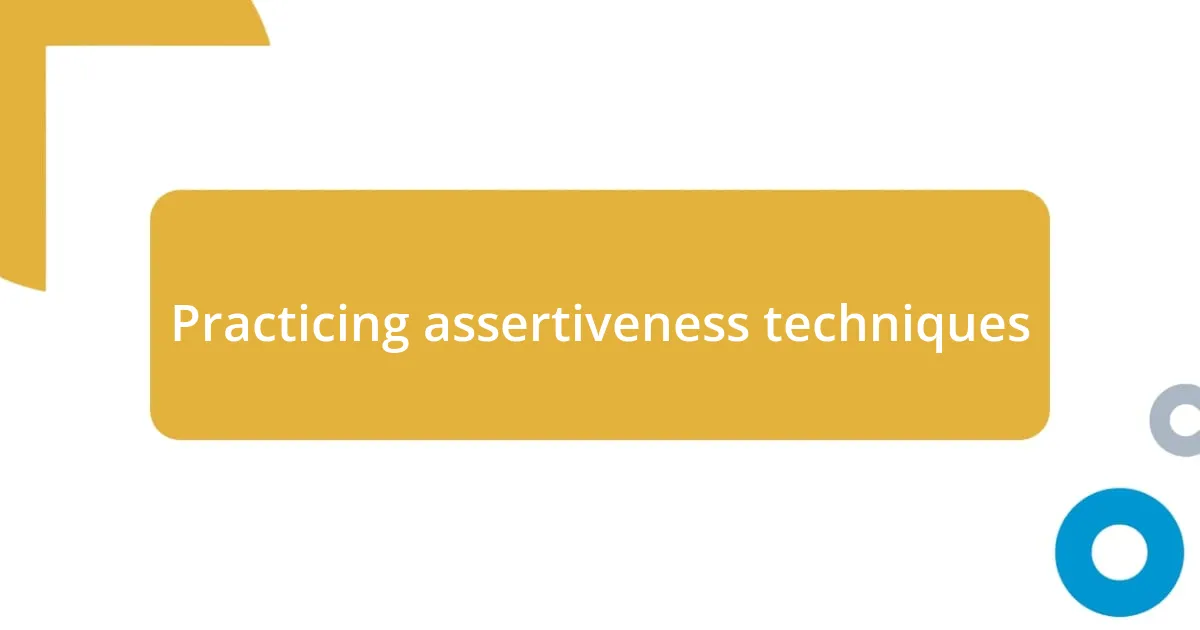
Practicing assertiveness techniques
Practicing assertiveness techniques has been a game-changer for me. I remember attending a workshop where the instructor emphasized role-playing scenarios. The first time I tried it, I felt awkward, but with each attempt, I noticed a surge in my confidence. This practice taught me to convey my needs and desires without sounding defensive or aggressive. Have you ever tried to express your needs but felt your voice wavering? I’ve been there, and it’s frustrating. I realized that the more I practiced, the easier it became to articulate my boundaries clearly and assertively.
Another technique that has helped me is using the “broken record” method. This approach involves calmly repeating your boundary until it’s acknowledged. There was an instance when a family member kept asking me to attend events I wasn’t comfortable with. Instead of getting frustrated, I firmly responded each time with, “I appreciate the invite, but I need to prioritize my personal time.” At first, it felt repetitive, but it eventually showed them that my boundaries were non-negotiable. Have you ever noticed how consistent messaging can shift people’s perceptions over time? It’s remarkable how repetition reinforces your stance and garners respect.
Lastly, embodying assertiveness also requires me to manage my non-verbal communication. I’ll never forget when I was standing in front of a group, sharing my thoughts, and noticed I was crossing my arms. Realizing this made me immediately uncross them and stand tall. The shift in my body language communicated confidence, even before I spoke. I ask myself, is my posture supporting my message? This awareness has been crucial in reinforcing my verbal boundaries. It’s fascinating how our physical presence can either strengthen or dilute what we’re trying to convey!
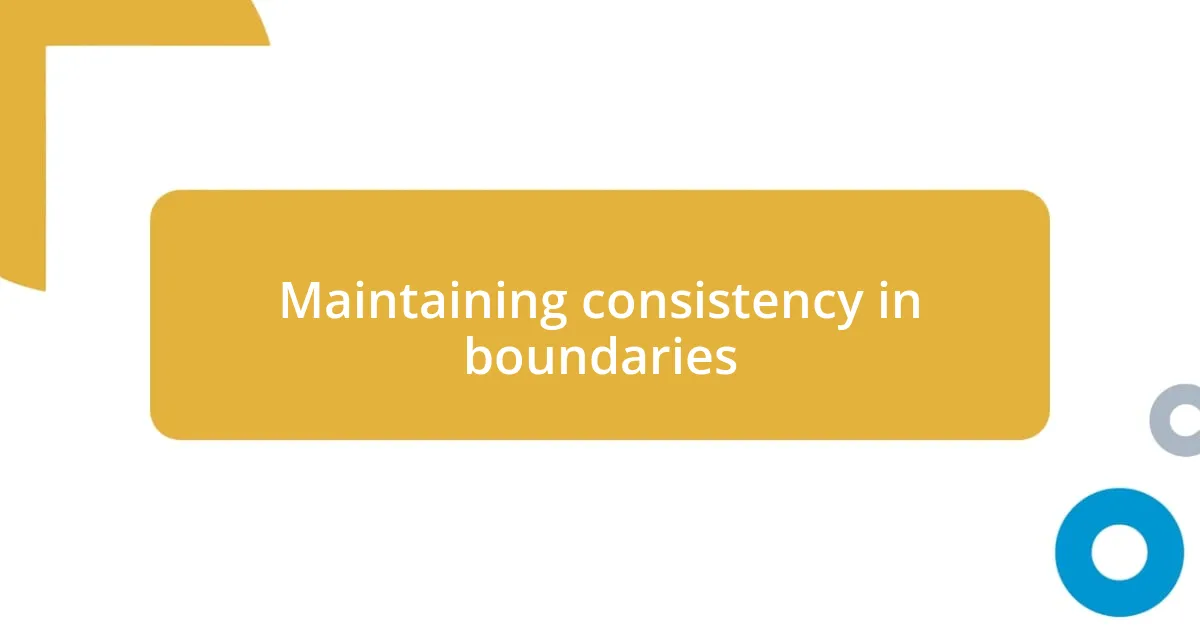
Maintaining consistency in boundaries
Continuity in maintaining boundaries is something I’ve learned the hard way. There was a time when I set a boundary with a colleague about not discussing work after hours, yet I let it slip occasionally when they reached out. Each time, I felt a knot of anxiety in my stomach as I realized I was sacrificing my peace. It dawned on me that inconsistency only led to more confusion, not just for me, but for them too. I took a breath and committed to remaining steadfast.
Being consistent isn’t just about saying “no” or asserting a boundary once; it’s a continuous practice. I remember a period where a close friend kept inviting me to outings I wasn’t comfortable with. For a while, I agreed to join sporadically, thinking it would appease them. But each time the event rolled around, I felt resentful. I had to remind myself that sticking to my guns didn’t mean I was unkind; it meant I valued my well-being. So, I turned down every invitation thereafter, and surprisingly, our friendship blossomed as they recognized and respected my limitations.
I often reflect on how difficult it can be to maintain these boundaries consistently. One practice I’ve found valuable is journaling about my feelings whenever I felt tempted to back down. It helps me clarify why these boundaries matter to me. Have you ever felt torn between pleasing someone and preserving your sanity? That internal tug-of-war can be exhausting! Writing down my experiences has turned into an empowering reminder of why I needed to stay firm. Each page became a testament to my journey toward greater self-respect.
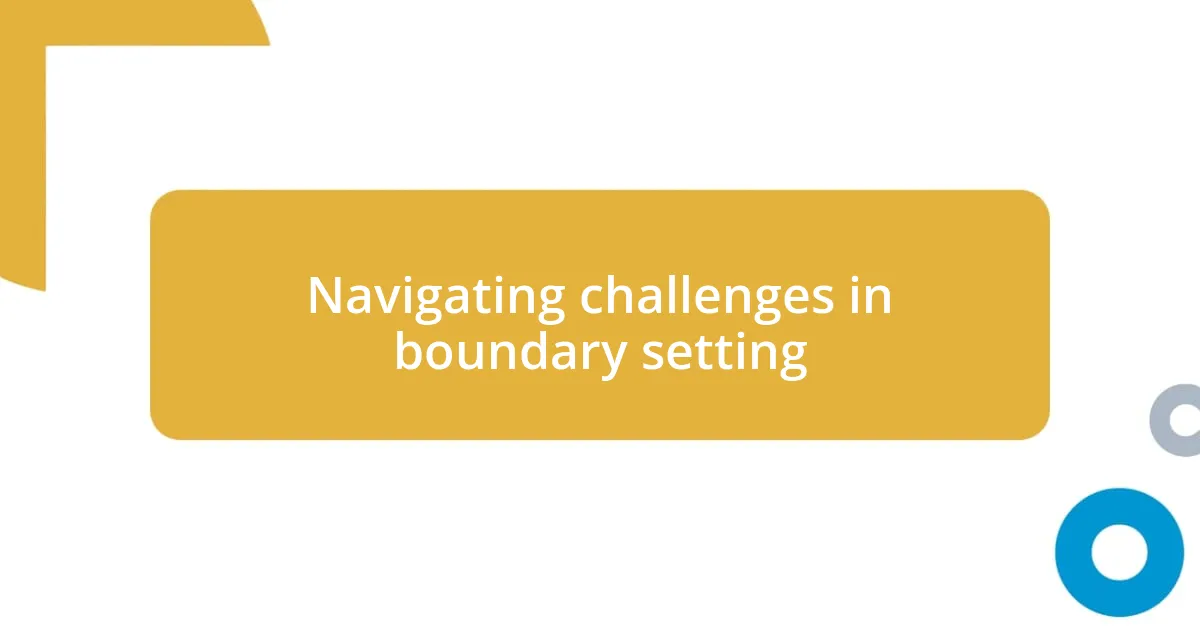
Navigating challenges in boundary setting
Setting boundaries can be an emotional rollercoaster. I recall a time when I had to navigate a tricky situation with a close family member. They kept oversharing personal details, and I felt overwhelmed. Instead of confronting them outright, I chose to express how their sharing made me feel. It was awkward, and I could sense the tension in the air. But once I voiced my discomfort, something shifted. It taught me that facing challenges in boundary setting often leads to deeper understanding, even if it feels intimidating at first.
Another layer to consider is the internal dialogues we have while establishing boundaries. I used to struggle with guilt during these moments. I remember a day when I needed to say “no” to a friend’s request for help with a project. As I hesitated, the guilt washed over me. “Am I being selfish?” was my recurring thought. But as I navigated through those feelings, I realized that prioritizing my own needs isn’t selfish; it’s necessary for my well-being. Have you ever questioned your right to say no? It’s enlightening to understand that by asserting my boundaries, I am asserting my self-worth.
Sometimes, external pressures can complicate boundary setting. I’ve sensed this during team meetings at work where everyone seems to expect “just one more favor.” Initially, I felt compelled to comply, fearing disappointment. However, I decided to speak up. I shared my workload challenges, and remarkably, the understanding was mutual. I found that advocating for my limits encouraged others in the team to do the same. How often do we underestimate the power of authenticity in group dynamics? Embracing my own authenticity helped foster a culture of support among my peers.
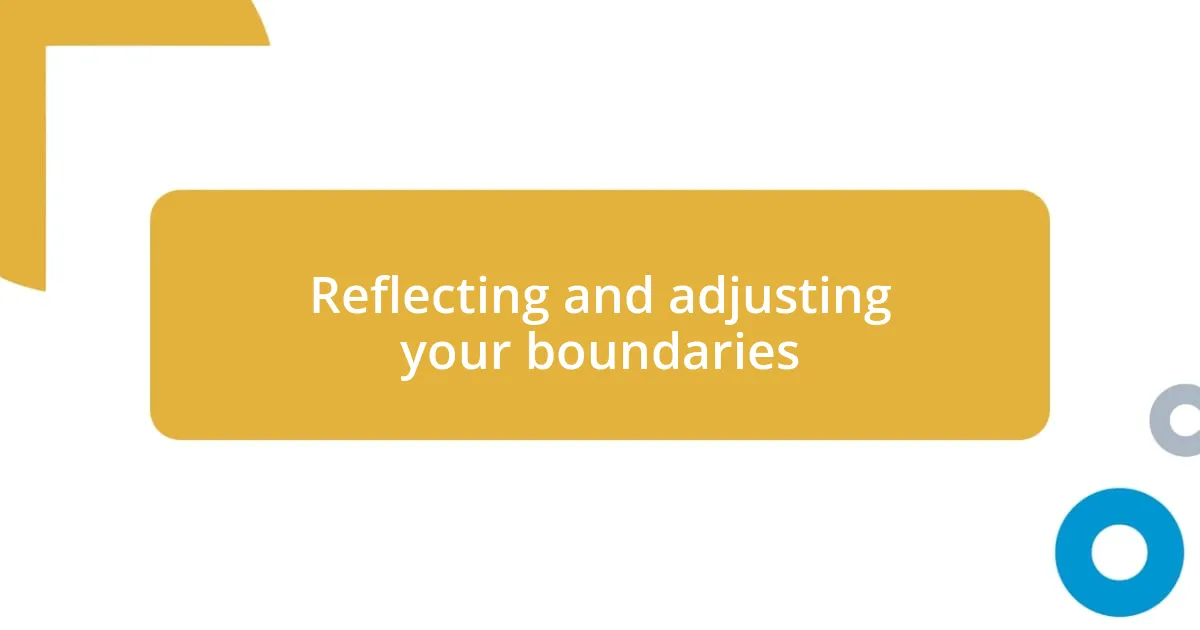
Reflecting and adjusting your boundaries
Reflecting on my boundaries is a practice I didn’t prioritize until I realized how essential it is for my emotional well-being. For example, there was a time when I felt overwhelmed by my volunteer commitments. I kept stretching myself thin, thinking I was being helpful. But moments of frustration surfaced every time I found myself canceling plans with friends because of it. This reflection pushed me to reassess my priorities and ultimately led to adjusting my commitments to strike a healthier balance.
Adjusting boundaries can be uncomfortable, yet it often unveils deeper insights about our needs. I remember recalibrating my availability with a friend who frequently expected late-night talks. At first, I worried about disappointing her. But when I shared that late-night conversations were exhausting for me, I felt this weight lift. Was it worth sacrificing my rest to keep someone else happy? Clearly, I had to prioritize my well-being, and it strengthened our friendship in the long run by fostering honesty.
After implementing changes, I realized checking in with myself frequently made a world of difference. There was a stretch where I felt my boundaries blending again, particularly with social outings. I started asking myself, “Am I saying yes out of obligation or genuine desire?” Each time I posed this question, I gained clarity and confidence in saying “no” when needed. This practice of self-inquiry not only supported my boundaries but also deepened my connection to what truly brings me joy. How often do you take a moment to reflect on what feels right for you? It can be a surprising and enlightening journey.












